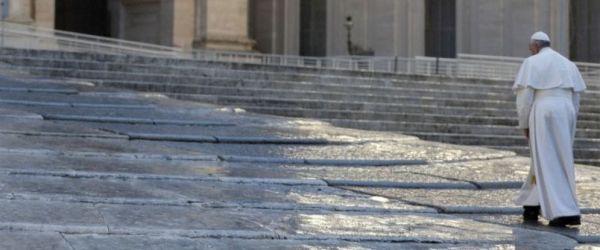This Sunday, we continue the Reading of Chapter Six of the Gospel according to John, in which Jesus, after performing the great miracle of the multiplication of the loaves, explains to the people the meaning of that “sign” (Jn 6:41-51).
As he had done earlier with the Samaritan woman, starting from the experience of thirst and the sign of water, here Jesus begins from the experience of hunger and the sign of bread, to reveal himself and to offer an invitation to believe in him.
The people seek him, the people listen to him, because they are still enthusiastic about the miracle; they want to make him king! However, when Jesus affirms that he is the true bread given by God, many are shocked, they do not understand, and begin murmuring among themselves, saying: “Do we not know his father and mother? How does he now say, ‘I have come down from heaven’?” (cf. Jn 6:42). And they begin to murmur. Then Jesus says, “No one can come to me unless the Father who sent me draws him”, and he adds: “he who believes has eternal life” (vv. 44, 47).
This word of the Lord astonishes us, and makes us think. It introduces the dynamic of faith, which is a relationship: the relationship between the human person — all of us — and the Person of Jesus, where the Father plays a decisive role, and, of course, the Holy Spirit does too, which is implied here. To believe in Him, it is not enough to meet Jesus, it is not enough to read the Bible, the Gospel — this is important! But it is not enough. It is not even enough to witness a miracle, such as that of the multiplication of the loaves. So many people were in close contact with Jesus and they did not believe. In fact, they even despised and condemned him. And I ask myself: Why this? Were they not attracted by the Father? No, this happened because their hearts were closed to the action of God’s Spirit. If your heart is always closed, faith doesn’t enter! Instead God the Father draws us to Jesus: it is we who open or close our hearts. Instead, faith, which is like a seed deep in the heart, blossoms when we let the Father draw us to Jesus, and we “go to Him” with an open heart, without prejudices; then we recognize in his face the Face of God, and in his words the Word of God, because the Holy Spirit has made us enter into the relationship of love and of life between Jesus and God the Father. And there we receive a gift, the gift of the faith.
With this attitude of faith, we can also understand the meaning of the “Bread of Life” that Jesus gives us, and which he describes in this way: “I am the living bread which came down from heaven; if any one eats of this bread, he will live for ever; and the bread which I shall give for the life of the world is my flesh” (Jn 6:51). In Jesus, in his “flesh” — that is, in his concrete humanity — is all the love of God, which is the Holy Spirit. Those who let themselves be drawn by this love go to Jesus and go with faith, and receive from Him life, eternal life.
The one who lived this experience in such an exemplary way was Mary, the Virgin of Nazareth: the first human person who believed in God by accepting the flesh of Jesus. Let us learn from her, our Mother, joy and gratitude through the gift of faith. A gift that is not “private”, a gift that is not private property but is a gift to be shared: it is a gift “for the life of the world”!
[Pope Francis, Angelus 9 August 2015]












